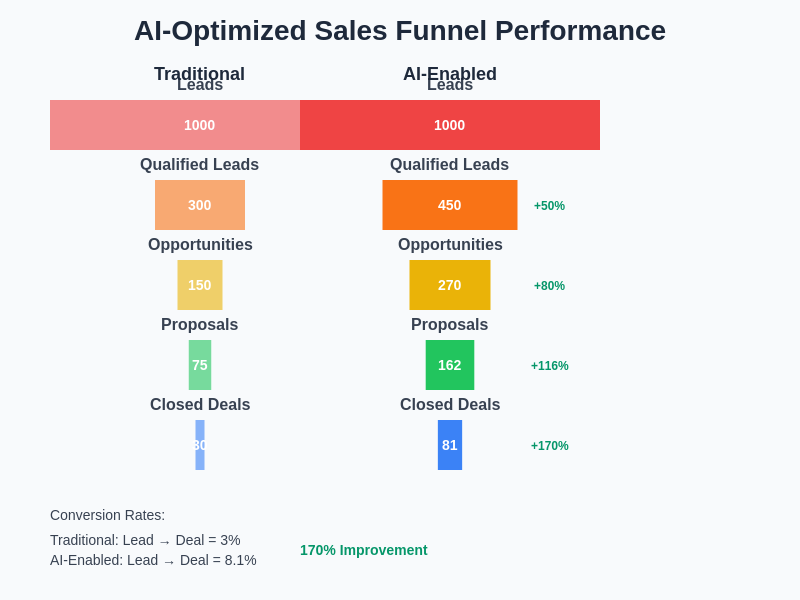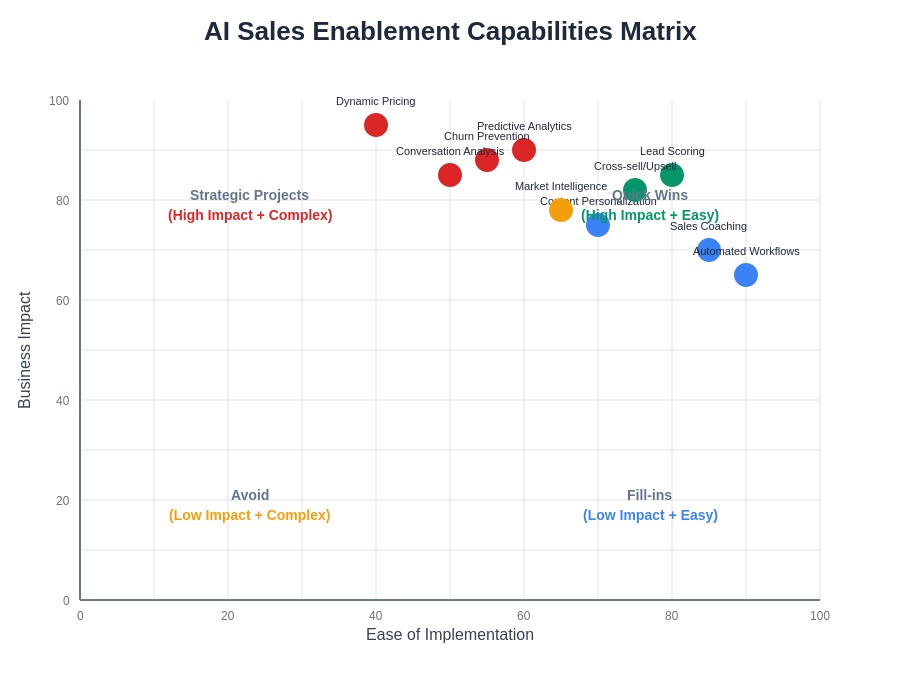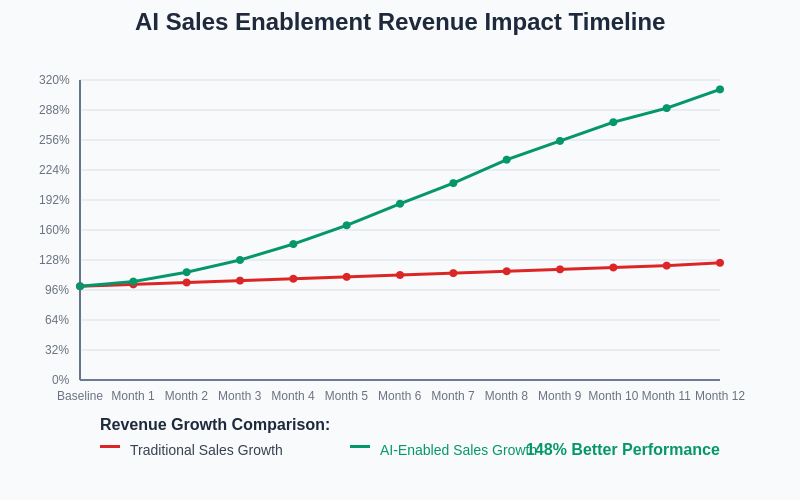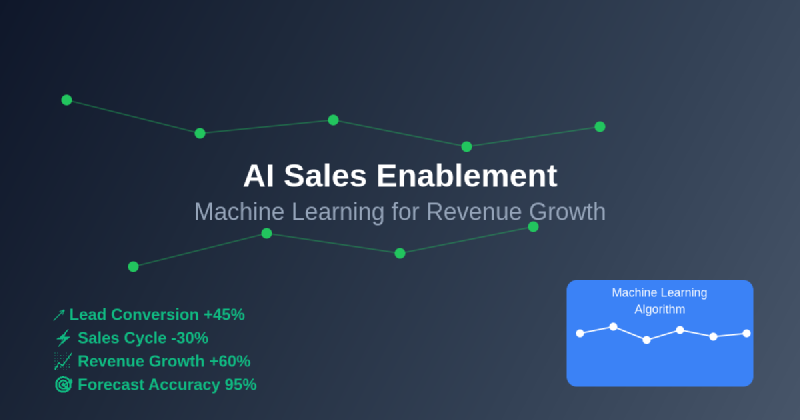The modern sales landscape has undergone a revolutionary transformation with the integration of artificial intelligence and machine learning technologies that are fundamentally reshaping how businesses approach customer acquisition, relationship management, and revenue optimization. These sophisticated technologies have evolved beyond simple automation tools to become strategic enablers that provide deep insights into customer behavior, predict market trends, and optimize sales processes with unprecedented precision and effectiveness.
Explore the latest AI trends transforming business as artificial intelligence continues to reshape sales methodologies and drive remarkable revenue growth across industries worldwide. The convergence of AI capabilities with sales expertise represents a paradigm shift that empowers sales teams to make data-driven decisions while maintaining the human touch that remains essential for building meaningful customer relationships and closing complex deals.
The Evolution of Sales Intelligence
The traditional sales approach relied heavily on intuition, experience, and manual processes that often resulted in inefficient resource allocation and missed opportunities. Modern AI-powered sales enablement platforms have transformed this landscape by introducing sophisticated algorithms that analyze vast amounts of customer data, market trends, and behavioral patterns to provide actionable insights that drive revenue growth and improve sales performance across all stages of the customer journey.
Machine learning algorithms excel at identifying subtle patterns in customer data that human analysis might overlook, enabling sales teams to understand prospect preferences, predict buying behavior, and tailor their approach accordingly. This transformation has resulted in higher conversion rates, shorter sales cycles, and more accurate forecasting that allows businesses to allocate resources more effectively and pursue the most promising opportunities with greater confidence and strategic precision.
The integration of AI into sales processes has democratized access to advanced analytics and predictive capabilities that were once available only to large enterprises with substantial technology investments. Today, businesses of all sizes can leverage AI-powered tools to gain competitive advantages, optimize their sales strategies, and achieve sustainable revenue growth through data-driven decision making and intelligent automation of routine tasks.

The transformation of traditional sales funnels through AI optimization demonstrates remarkable improvements in conversion rates at every stage of the customer journey. These enhancements result from sophisticated algorithms that identify optimal touchpoints, personalize interactions, and predict customer behavior with unprecedented accuracy.
Predictive Lead Scoring and Qualification
One of the most impactful applications of machine learning in sales enablement involves the development of sophisticated lead scoring systems that evaluate prospects based on multiple data points, behavioral indicators, and historical patterns. These AI-driven systems analyze factors such as website engagement, email interactions, social media activity, demographic information, and firmographic data to assign predictive scores that indicate the likelihood of conversion and optimal timing for sales engagement.
Traditional lead qualification processes often relied on subjective assessments and limited data points that could result in inconsistent evaluations and missed opportunities. Machine learning algorithms process hundreds of variables simultaneously to create comprehensive prospect profiles that enable sales teams to prioritize their efforts on the most promising leads while identifying potential roadblocks and objections before they become impediments to closing deals.
The predictive accuracy of AI-powered lead scoring systems continues to improve over time as the algorithms learn from successful conversions and failed attempts, creating increasingly sophisticated models that adapt to changing market conditions and evolving customer preferences. This continuous learning capability ensures that sales teams always have access to the most current and relevant insights for maximizing their conversion rates and revenue potential.
Intelligent Customer Relationship Management
Modern CRM systems enhanced with artificial intelligence capabilities provide sales professionals with unprecedented visibility into customer relationships, interaction history, and engagement patterns that inform strategic decision-making throughout the sales process. These AI-powered platforms automatically capture and analyze customer touchpoints, communication preferences, and behavioral signals to create comprehensive customer profiles that guide personalized engagement strategies and relationship development efforts.
Enhance your sales process with advanced AI tools like Claude that provide sophisticated analysis capabilities and strategic insights for optimizing customer relationship management and revenue generation. The integration of AI into CRM systems transforms static databases into dynamic intelligence platforms that continuously update customer insights and recommend optimal engagement strategies based on real-time data analysis and predictive modeling.
Machine learning algorithms excel at identifying relationship patterns and communication preferences that enable sales teams to tailor their approach to individual customers and prospects. These systems can predict the most effective communication channels, optimal timing for outreach, and personalized messaging strategies that resonate with specific customer segments, resulting in higher engagement rates and more successful sales outcomes.
Sales Forecasting and Pipeline Optimization
Accurate sales forecasting has long been one of the most challenging aspects of sales management, with traditional methods often relying on subjective assessments and historical averages that fail to account for dynamic market conditions and individual deal complexities. AI-powered forecasting systems analyze multiple data sources including deal history, customer interactions, market trends, and external factors to generate probabilistic forecasts that provide more accurate predictions and better visibility into future revenue potential.
These sophisticated forecasting models consider factors such as deal stage progression rates, customer engagement levels, competitive dynamics, and seasonal variations to create comprehensive pipeline analyses that help sales managers make informed decisions about resource allocation, quota setting, and strategic planning. The ability to identify potential risks and opportunities early in the sales process enables proactive management interventions that can significantly impact final outcomes.
Pipeline optimization through machine learning extends beyond forecasting to include recommendations for accelerating deal progression, identifying bottlenecks, and suggesting strategic actions that increase win rates. These AI-driven insights help sales teams focus their efforts on activities that generate the highest return on investment while minimizing time spent on low-probability opportunities that drain resources without contributing to revenue growth.
Personalization and Dynamic Pricing Strategies
The modern marketplace demands personalized experiences that resonate with individual customer needs and preferences, and AI-powered sales enablement platforms excel at creating tailored approaches that maximize engagement and conversion potential. Machine learning algorithms analyze customer data, purchase history, and behavioral patterns to recommend personalized product configurations, pricing strategies, and value propositions that align with specific customer requirements and budget constraints.
Dynamic pricing optimization represents one of the most sophisticated applications of AI in sales enablement, where algorithms continuously analyze market conditions, competitor pricing, customer willingness to pay, and demand patterns to recommend optimal pricing strategies that maximize revenue while maintaining competitive positioning. These systems can adjust pricing recommendations in real-time based on changing market conditions and customer interactions, ensuring that sales teams always have access to the most effective pricing strategies for each unique situation.
Personalization extends beyond pricing to include customized product recommendations, tailored marketing messages, and individualized sales processes that reflect customer preferences and buying patterns. This level of personalization creates more engaging customer experiences that build stronger relationships and increase the likelihood of successful conversions while reducing the sales cycle length and improving customer satisfaction scores.
Automated Sales Content and Communication
The creation and delivery of relevant sales content has been revolutionized by AI technologies that can generate personalized proposals, presentations, and communications that address specific customer needs and objections. Natural language processing algorithms analyze customer interactions and requirements to automatically generate customized content that reflects individual preferences, industry-specific challenges, and unique value propositions that resonate with target audiences.
Leverage AI research capabilities with Perplexity to enhance your sales content creation and market research efforts with comprehensive information gathering and analysis tools. AI-powered content generation systems can create detailed proposals, technical specifications, and competitive analyses that support sales efforts while ensuring consistency and accuracy across all customer communications.
Automated communication systems powered by machine learning can optimize email sequences, follow-up timing, and message personalization to improve response rates and engagement levels. These systems learn from successful communication patterns to recommend optimal messaging strategies, communication frequency, and content types that generate the highest levels of customer engagement and progression through the sales funnel.
Sales Performance Analytics and Coaching
Advanced analytics capabilities enabled by machine learning provide sales managers with detailed insights into individual and team performance patterns that inform coaching strategies and professional development initiatives. These systems analyze activity data, conversion rates, and behavioral patterns to identify strengths, weaknesses, and improvement opportunities that can be addressed through targeted training and coaching interventions.
AI-powered performance analytics can identify the most effective sales techniques, optimal activity levels, and successful behavioral patterns that can be replicated across the sales organization. By analyzing successful sales professionals and their approaches, these systems can recommend best practices and coaching strategies that help underperforming team members improve their results and contribute more effectively to revenue growth objectives.
The continuous monitoring and analysis capabilities of AI systems enable real-time performance feedback and coaching recommendations that help sales professionals adjust their strategies and tactics based on current results and market conditions. This immediate feedback loop accelerates learning and improvement while ensuring that sales teams remain aligned with evolving customer expectations and market dynamics.
Customer Churn Prevention and Retention
Identifying at-risk customers and implementing proactive retention strategies has become increasingly sophisticated through the application of machine learning algorithms that analyze customer behavior patterns, engagement levels, and satisfaction indicators to predict churn probability and recommend intervention strategies. These predictive models can identify early warning signs that indicate declining customer satisfaction or increasing likelihood of defection, enabling sales teams to take proactive measures to address concerns and strengthen relationships.
AI-powered retention systems analyze factors such as usage patterns, support ticket frequency, payment history, and communication frequency to create comprehensive risk assessments that guide targeted retention efforts. By identifying customers who are most likely to churn, sales teams can prioritize their retention efforts on high-value accounts while developing personalized strategies that address specific concerns and strengthen customer loyalty.
The ability to predict and prevent customer churn represents a significant opportunity for revenue optimization, as retaining existing customers is typically more cost-effective than acquiring new ones. Machine learning algorithms can recommend specific retention strategies, optimal timing for intervention, and personalized offers that maximize the likelihood of successful retention while maintaining profitability and customer satisfaction.
Cross-Selling and Upselling Optimization
AI-powered recommendation engines have transformed cross-selling and upselling strategies by analyzing customer purchase history, usage patterns, and preferences to identify optimal opportunities for additional revenue generation. These sophisticated systems can predict which products or services are most likely to appeal to specific customers based on their current usage, industry requirements, and behavioral patterns, enabling sales teams to make targeted recommendations that provide genuine value while increasing revenue.
Machine learning algorithms excel at identifying subtle patterns in customer data that reveal hidden opportunities for expansion and growth. By analyzing successful cross-selling and upselling patterns across the customer base, these systems can recommend timing strategies, product combinations, and presentation approaches that maximize acceptance rates and revenue potential while maintaining customer satisfaction and relationship strength.
The optimization of cross-selling and upselling efforts through AI extends beyond product recommendations to include pricing strategies, bundling options, and value proposition development that resonates with specific customer segments. These data-driven approaches ensure that expansion efforts are focused on opportunities that provide mutual value while contributing to sustainable revenue growth and customer lifetime value optimization.
Market Intelligence and Competitive Analysis
Modern AI systems provide sales teams with comprehensive market intelligence capabilities that analyze competitor activities, industry trends, and market dynamics to inform strategic decision-making and competitive positioning strategies. These platforms continuously monitor news sources, social media, patent filings, and public information to provide real-time insights into competitive movements and market opportunities that can influence sales strategies and tactical approaches.
Machine learning algorithms can identify emerging market trends, shifting customer preferences, and competitive threats before they become widely apparent, enabling sales teams to adapt their strategies proactively and maintain competitive advantages. This early warning capability allows businesses to adjust their positioning, modify their value propositions, and develop countermeasures that protect market share while pursuing new growth opportunities.
The integration of market intelligence into sales enablement platforms provides context for customer interactions and strategic planning that enhances the effectiveness of sales efforts. By understanding competitive dynamics and market conditions, sales professionals can tailor their approaches to address customer concerns, differentiate their offerings, and position their solutions more effectively against competitive alternatives.

The strategic prioritization of AI sales enablement capabilities requires careful evaluation of both business impact and implementation complexity. This matrix helps organizations identify quick wins while planning for more complex strategic initiatives that deliver transformational results over time.
Integration and Implementation Strategies
Successfully implementing AI-powered sales enablement requires careful consideration of existing systems, data quality, organizational readiness, and change management strategies that ensure smooth adoption and maximum return on investment. The integration process involves evaluating current technology infrastructure, identifying data sources, establishing governance protocols, and developing training programs that prepare sales teams to leverage AI capabilities effectively.
Data quality and integration represent critical success factors for AI implementation, as machine learning algorithms require clean, comprehensive, and consistent data to generate accurate insights and recommendations. Organizations must invest in data cleansing, standardization, and integration efforts that create reliable foundations for AI applications while establishing ongoing maintenance processes that preserve data quality over time.
Change management and training initiatives play essential roles in successful AI adoption, as sales professionals must understand how to interpret AI-generated insights, incorporate recommendations into their workflows, and maintain the human elements of relationship building that remain critical for sales success. Organizations that invest in comprehensive training and support programs typically achieve better adoption rates and more significant performance improvements from their AI investments.
Measuring ROI and Performance Impact
Quantifying the return on investment from AI-powered sales enablement initiatives requires comprehensive measurement frameworks that track both direct revenue impacts and operational efficiency improvements across multiple dimensions of sales performance. These measurement systems must account for factors such as conversion rate improvements, sales cycle acceleration, forecast accuracy enhancement, and productivity gains that contribute to overall revenue growth and profitability.
Key performance indicators for AI sales enablement include metrics such as lead-to-opportunity conversion rates, opportunity-to-close conversion rates, average deal size, sales cycle length, forecast accuracy, and sales representative productivity measures that provide comprehensive visibility into the impact of AI investments on sales performance. These metrics should be tracked over time to identify trends and validate the ongoing value of AI implementations.
The measurement of AI impact extends beyond immediate sales results to include strategic benefits such as improved customer satisfaction, enhanced competitive positioning, better resource allocation, and increased sales team satisfaction that contribute to long-term success and sustainability. Organizations that establish comprehensive measurement frameworks are better positioned to optimize their AI investments and demonstrate value to stakeholders while identifying opportunities for continuous improvement and expansion.

The long-term revenue impact of AI sales enablement demonstrates accelerating returns over time as systems learn and optimize performance. Organizations typically see initial improvements within the first quarter, with exponential growth benefits emerging as AI algorithms mature and sales teams become more proficient with AI-enhanced processes.
Future Trends and Emerging Technologies
The evolution of AI in sales enablement continues to accelerate with emerging technologies such as advanced natural language processing, computer vision, augmented reality, and quantum computing that promise to unlock new capabilities and applications for revenue optimization. These advancing technologies will enable more sophisticated customer interactions, enhanced product demonstrations, improved data analysis, and automated decision-making that further transform sales processes and outcomes.
Conversational AI and chatbot technologies are becoming increasingly sophisticated, enabling automated customer interactions that can qualify leads, answer questions, schedule meetings, and provide product information that supports sales efforts while reducing the workload on human sales professionals. These technologies will continue to evolve to handle more complex interactions and provide more valuable support for sales activities.
The integration of AI with emerging technologies such as virtual reality and augmented reality will create new opportunities for immersive product demonstrations and customer experiences that can significantly impact buying decisions and sales outcomes. As these technologies become more accessible and affordable, they will likely become standard components of comprehensive sales enablement platforms that provide competitive advantages for early adopters.
Disclaimer
This article is for informational purposes only and does not constitute professional advice regarding AI implementation or sales strategy development. The views expressed are based on current understanding of AI technologies and their applications in sales enablement. Readers should conduct thorough research and consider their specific business requirements when evaluating AI-powered sales solutions. The effectiveness of AI implementations may vary depending on data quality, organizational readiness, and specific use cases. Organizations should work with qualified professionals when planning and implementing AI initiatives.
